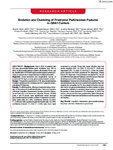Evolution and clustering of prodromal parkinsonian features in GBA1 carriers
| dc.contributor.author | Mullin, Stephen | |
| dc.contributor.author | Beavan, M | |
| dc.contributor.author | Bestwick, J | |
| dc.contributor.author | McNeill, A | |
| dc.contributor.author | Proukakis, C | |
| dc.contributor.author | Cox, T | |
| dc.contributor.author | Hughes, D | |
| dc.contributor.author | Mehta, A | |
| dc.contributor.author | Zetterberg, H | |
| dc.contributor.author | Schapira, AHV | |
| dc.date.accessioned | 2021-09-21T10:37:32Z | |
| dc.date.issued | 2019-09 | |
| dc.identifier.issn | 0885-3185 | |
| dc.identifier.issn | 1531-8257 | |
| dc.identifier.uri | http://hdl.handle.net/10026.1/17894 | |
| dc.description.abstract |
<jats:title>Abstract</jats:title><jats:sec><jats:title>Background</jats:title><jats:p>Five to 25% of patients with PD carry glucocerebrosidase gene mutations, and 10% to 30% of glucocerebrosidase carriers will develop PD by age 80. Stratification of PD risk in glucocerebrosidase carriers provides an opportunity to target disease‐modifying therapies.</jats:p></jats:sec><jats:sec><jats:title>Objective</jats:title><jats:p>Cross‐sectional and longitudinal survey of prodromal PD signs among glucocerebrosidase carriers.</jats:p></jats:sec><jats:sec><jats:title>Design</jats:title><jats:p>Prospective assessment of 82 glucocerebrosidase mutation carriers and 35 controls over 4 to 5 years for prodromal clinical PD features.</jats:p></jats:sec><jats:sec><jats:title>Results</jats:title><jats:p>At all time points, olfactory (measured using University of Pennsylvania Smell Identification Test) and cognitive (Montreal Cognitive Assessment) function and the International Parkinson and Movement Disorder Society UPDRS parts II and III scores were significantly worse amongst glucocerebrosidase mutation carriers. Progression to microsmia (odds ratio: 8.5; 95% confidence interval: 2.6–28.2; <jats:italic>P</jats:italic> < 0.05) and mild cognitive impairment (odds ratio: 4.2; 95% confidence interval: 1.1–16.6; <jats:italic>P</jats:italic> < 0.05) were more rapid compared to controls. Those with worse olfaction also had worse cognition (OR, 1.5; 95% CI: 0.0–2.8; <jats:italic>P</jats:italic> < 0.05) and depression (OR, 1.3; 95% CI: 0.6–2.8; <jats:italic>P</jats:italic> < 0.05). No participants reached the MDS prodromal PD diagnostic criteria before PD diagnosis. One participant developed PD. He did not fulfill the International Parkinson and Movement Disorder Society prodromal PD criteria before diagnosis.</jats:p></jats:sec><jats:sec><jats:title>Conclusion</jats:title><jats:p>Assessment of individual and clustered PD prodromal features may serve as a useful tool to identify high‐risk subjects for conversion to PD. As a result of the low conversion rate in our glucocerebrosidase mutation carriers to date, prospective validation is needed in larger cohorts to establish the profile of these features in PD convertors. © 2019 The Authors. <jats:italic>Movement Disorders</jats:italic> published by Wiley Periodicals, Inc. on behalf of International Parkinson and Movement Disorder Society.</jats:p></jats:sec> | |
| dc.format.extent | 1365-1373 | |
| dc.format.medium | Print-Electronic | |
| dc.language | en | |
| dc.language.iso | en | |
| dc.publisher | Wiley | |
| dc.subject | cognition | |
| dc.subject | depression | |
| dc.subject | glucocerebrosidase | |
| dc.subject | Gaucher | |
| dc.subject | olfaction | |
| dc.subject | Parkinson's | |
| dc.subject | prodromal | |
| dc.title | Evolution and clustering of prodromal parkinsonian features in GBA1 carriers | |
| dc.type | journal-article | |
| dc.type | Journal Article | |
| dc.type | Research Support, Non-U.S. Gov't | |
| plymouth.author-url | https://www.webofscience.com/api/gateway?GWVersion=2&SrcApp=PARTNER_APP&SrcAuth=LinksAMR&KeyUT=WOS:000486741500020&DestLinkType=FullRecord&DestApp=ALL_WOS&UsrCustomerID=11bb513d99f797142bcfeffcc58ea008 | |
| plymouth.issue | 9 | |
| plymouth.volume | 34 | |
| plymouth.publication-status | Published | |
| plymouth.journal | Movement Disorders | |
| dc.identifier.doi | 10.1002/mds.27775 | |
| plymouth.organisational-group | /Plymouth | |
| plymouth.organisational-group | /Plymouth/Faculty of Health | |
| plymouth.organisational-group | /Plymouth/Faculty of Health/Peninsula Medical School | |
| plymouth.organisational-group | /Plymouth/REF 2021 Researchers by UoA | |
| plymouth.organisational-group | /Plymouth/REF 2021 Researchers by UoA/UoA01 Clinical Medicine | |
| plymouth.organisational-group | /Plymouth/Research Groups | |
| plymouth.organisational-group | /Plymouth/Research Groups/FoH - Applied Parkinson's Research | |
| plymouth.organisational-group | /Plymouth/Research Groups/FoH - Community and Primary Care | |
| plymouth.organisational-group | /Plymouth/Users by role | |
| plymouth.organisational-group | /Plymouth/Users by role/Academics | |
| plymouth.organisational-group | /Plymouth/Users by role/Researchers in ResearchFish submission | |
| dc.publisher.place | United States | |
| dcterms.dateAccepted | 2019-05-30 | |
| dc.rights.embargodate | 2021-9-22 | |
| dc.identifier.eissn | 1531-8257 | |
| dc.rights.embargoperiod | Not known | |
| rioxxterms.versionofrecord | 10.1002/mds.27775 | |
| rioxxterms.licenseref.uri | http://www.rioxx.net/licenses/all-rights-reserved | |
| rioxxterms.licenseref.startdate | 2019-09 | |
| rioxxterms.type | Journal Article/Review |


